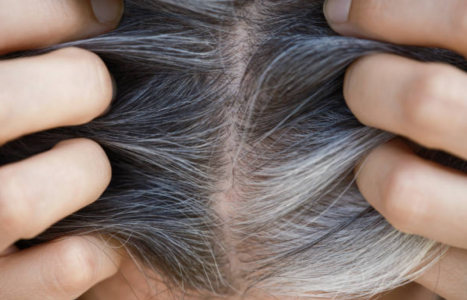Say Goodbye to Gray Hair for Good with This Revolutionary Trick Discovered by Scientists!
By
Gian T
- Replies 0
As we gracefully navigate the journey of life, many of us in the over-60s club have come to accept the silver strands that increasingly weave through our hair. While some wear their grey as a badge of experience and wisdom, others might prefer to maintain their original hair colour a bit longer. For those in the latter group, there's potentially exciting news on the horizon, thanks to a group of scientists from Nagoya University in Japan.
The researchers have made a discovery that could change the way we approach grey hair. They've identified an antioxidant called luteolin, which has shown promising results in preventing the greying process in mice. This could mean that reaching for hair dye to cover up those greys might become a thing of the past.
Luteolin is a naturally occurring compound found in abundance in several common vegetables, such as celery, broccoli, carrots, onions, and peppers. It's part of a healthy diet, especially for those who love a good salad. However, its potential benefits might extend beyond nutrition.
Professor Masashi Kato, the lead author of the study, expressed his surprise at the findings, suggesting that luteolin could have a unique medicinal effect that prevents greying. This is particularly intriguing for those of us who have noticed the gradual colour change from our 30s onwards. According to WebMD, the greying process varies among different ethnic groups, with white people typically starting to go grey in their mid-30s, Asian people in their late 30s, and Black people in their mid-40s. By the age of 50, it's common for half of the population to have a significant amount of grey hair.
The process of greying is natural and occurs as pigment cells in our hair follicles, which produce melanin, begin to die off. Without melanin, new hair strands grow in grey. While the 'silver fox' look is increasingly embraced, many still opt to cover their greys with hair dye.
In their study, the Nagoya University team aimed to understand whether three antioxidants – luteolin, hesperetin, and diosmetin – could be the answer to preventing grey hair. They bred mice to mimic the human greying process and treated them with one of the antioxidants, either topically or orally. The results were startling: mice given luteolin retained their black fur, while their untreated cage mates turned grey.
What's particularly interesting is that luteolin's effect seemed to be focused on pigmentation rather than the hair growth cycle. This specificity makes luteolin a compelling candidate for addressing age-related hair greying. While the antioxidant has only been tested in mice so far, the similarity in the greying process between mice and humans raises the possibility of an anti-greying treatment for humans in the near future.
For those who might not be keen on eating their veggies, luteolin is also available as a supplement for topical or oral use. Moreover, the researchers are optimistic that it could help prevent age-related balding, another common concern among seniors.
While we await further research to confirm these findings in humans, it's an exciting prospect that a simple dietary change or supplement could help maintain our hair's youthful colour. It's a reminder that sometimes, nature provides us with the best solutions to our everyday concerns.
 So, dear members of the Seniors Discount Club, what do you think about this discovery? Are you ready to stock up on luteolin-rich veggies, or will you wait for more conclusive evidence before you change your diet or supplement routine? Share your thoughts and your own tips for dealing with grey hair in the comments below. We love hearing from you, and who knows, your advice might just be the silver lining someone needs today!
So, dear members of the Seniors Discount Club, what do you think about this discovery? Are you ready to stock up on luteolin-rich veggies, or will you wait for more conclusive evidence before you change your diet or supplement routine? Share your thoughts and your own tips for dealing with grey hair in the comments below. We love hearing from you, and who knows, your advice might just be the silver lining someone needs today!
The researchers have made a discovery that could change the way we approach grey hair. They've identified an antioxidant called luteolin, which has shown promising results in preventing the greying process in mice. This could mean that reaching for hair dye to cover up those greys might become a thing of the past.
Luteolin is a naturally occurring compound found in abundance in several common vegetables, such as celery, broccoli, carrots, onions, and peppers. It's part of a healthy diet, especially for those who love a good salad. However, its potential benefits might extend beyond nutrition.
Professor Masashi Kato, the lead author of the study, expressed his surprise at the findings, suggesting that luteolin could have a unique medicinal effect that prevents greying. This is particularly intriguing for those of us who have noticed the gradual colour change from our 30s onwards. According to WebMD, the greying process varies among different ethnic groups, with white people typically starting to go grey in their mid-30s, Asian people in their late 30s, and Black people in their mid-40s. By the age of 50, it's common for half of the population to have a significant amount of grey hair.
The process of greying is natural and occurs as pigment cells in our hair follicles, which produce melanin, begin to die off. Without melanin, new hair strands grow in grey. While the 'silver fox' look is increasingly embraced, many still opt to cover their greys with hair dye.
In their study, the Nagoya University team aimed to understand whether three antioxidants – luteolin, hesperetin, and diosmetin – could be the answer to preventing grey hair. They bred mice to mimic the human greying process and treated them with one of the antioxidants, either topically or orally. The results were startling: mice given luteolin retained their black fur, while their untreated cage mates turned grey.
What's particularly interesting is that luteolin's effect seemed to be focused on pigmentation rather than the hair growth cycle. This specificity makes luteolin a compelling candidate for addressing age-related hair greying. While the antioxidant has only been tested in mice so far, the similarity in the greying process between mice and humans raises the possibility of an anti-greying treatment for humans in the near future.
For those who might not be keen on eating their veggies, luteolin is also available as a supplement for topical or oral use. Moreover, the researchers are optimistic that it could help prevent age-related balding, another common concern among seniors.
While we await further research to confirm these findings in humans, it's an exciting prospect that a simple dietary change or supplement could help maintain our hair's youthful colour. It's a reminder that sometimes, nature provides us with the best solutions to our everyday concerns.
Key Takeaways
- Scientists from Nagoya University in Japan have discovered that an antioxidant called luteolin may prevent greying of hair in mice.
- Luteolin is found in common vegetables such as celery, broccoli, carrots, onions, and peppers and may have similar beneficial effects on human hair greying.
- The study demonstrated that mice given luteolin retained their black fur while their untreated counterparts went grey.
- While the antioxidant has so far only been tested on mice, it holds potential for an anti-greying treatment for humans and could also prevent age-related balding.








